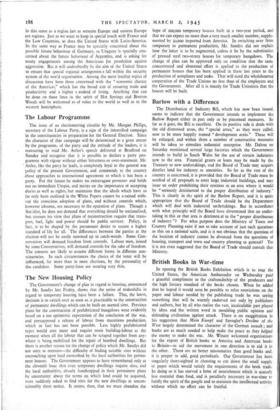Barlow with a Difference
The Distribution of Industry Bill, which has now been issued, seems to indicate that the Government intends to implement the Barlow Report either in part only or by piecemeal measures. So far as it goes, the Bill is excellent. On its positive side it deals with the old distressed areas, the "special areas," as they were called, now to be more happily named "development arels." These will be enlarged, and within them a number of' constructive measures
• will be taken to stimulate industrial enterprise. Mr. Dalton on Saturday mentioned several large factories 'which the Government intends to build in South Wales for the use of certain induitries oew to the area. Financial grants or loans may be made by the Treasury to new undertakings, and the Board of Trade may acquire derelict land for industry oi amenities. So far as the rest of the country is concerned, it is provided that the Board of Trade must be notified of all proposals to erect large industrial buildings, and may issue an order prohibiting their erection in an area where it would be "seriously detrimental to the proper distribution of industry." This is clearly in the spirit of the Barlow Report, and it is quite appropriate that the Board of Trade should be the Department which will deal with industrial uniertakings. But in accordance with what principle will the Board have determined that an under- taking in this or that area is dettimemal to the "proper distribution of industry "? For what purpose does the Ministry of Town and Country Planning exist if not to take account of just such questions as this on a national scale, and is it not obvious that the question of the location of industry cannot be divorced from the questions of housing, transport and town and country planning in general? ,Yet it is not even suggested that the Board of Trade should consult that Ministry.


























 Previous page
Previous page